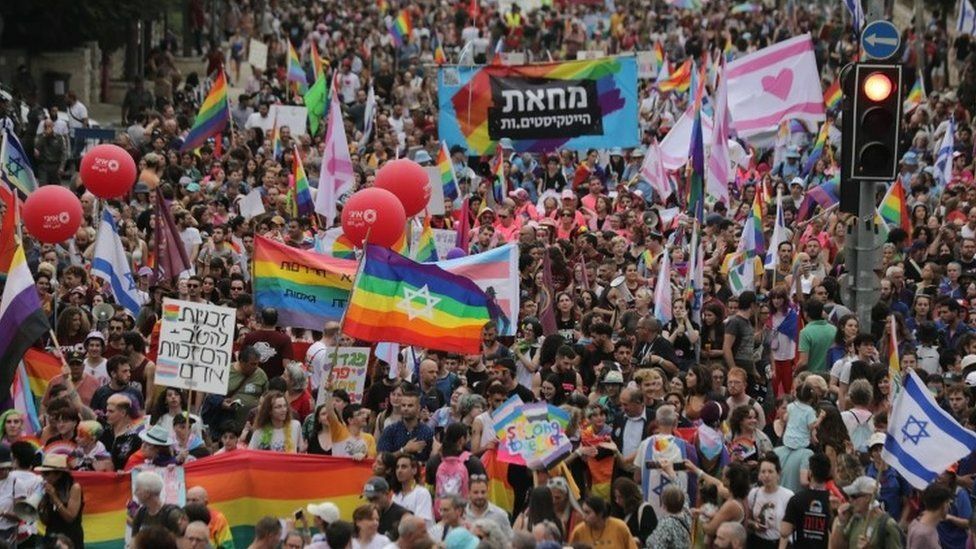Thousands jeer far-right minister at Jerusalem Gay Pride amid security fears

The Jerusalem Gay Pride march saw thousands of participants, despite security concerns due to online threats and counter-protests. This was the first march since the election of a hardline religious-nationalist government, which includes senior ministers with openly homophobic views. The event highlighted the deepening divisions within Israeli society, where secular Jews have long supported LGBTQ rights, but political and demographic shifts are increasingly empowering the nationalist and ultra-Orthodox right-wing.
Tensions were high, as in 2015, an ultra-Orthodox Jewish extremist killed a teenage participant at the march. Participants waved large rainbow and Israeli flags, and banners accusing far-right ministers of trying to force them “back in the closet”. Itamar Ben-Gvir, the far-right Police Minister, has a history of aggressively homophobic positions and once attended a so-called “beast parade” opposing LGBTQ rights.
Three individuals were arrested by the police due to threats made before the event, and an online watchdog reported a surge in homophobic hate speech. Far-right Telegram and WhatsApp groups published “violent and hateful messages” throughout the week, according to FakeReporter, which monitors online extremism. Lehava, a far-right group, referred to the march as the “abomination parade” and called for protests accompanied by a message stating that it would be a “deadly Thursday”.
The event was protected by barricades, and the route was patrolled by hundreds of armed police officers. Organisers reported a record attendance of 30,000 people after warning of a “public climate of danger” for LGBTQ individuals. As the rally began, Ben-Gvir, surrounded by his armed security team, briefly toured a street running parallel, causing marchers to rush to barricades and shout “shame” at him.
A few dozen ultra-religious and far-right protesters, organised by Lehava, were separated by police from the Gay Pride rally. Banners read: “Don’t let them have children” and “Jerusalem is not Sodom”, in reference to the biblical city supposedly destroyed by God for the sin of homosexuality.
This comes in a year marked by an unprecedented clash between secular Israelis and Prime Minister Benjamin Netanyahu’s government, culminating in weekly protests against the coalition’s now-delayed plans to strip powers from the Supreme Court. Netanyahu has rejected claims that his coalition would erode LGBTQ rights. He tweeted during the event: “I am proud that Israel is one of the most open countries in the world in relation to the gay community and that the discourse in it has become more accepting and respectful every year.”
Elisa Gilman, a Gay Pride marcher, stood with a sign offering “free hugs” to younger participants who “haven’t had a hug from a parent for a while” due to their sexuality. She told the BBC that many gay people were “worried” by the current coalition. Another marcher, Yuval from Jerusalem, said, “We’re here today to say that we are here to stay and that we will not give up.”
In 2006, Ben-Gvir attended a so-called beast parade against Gay Pride, in which religious activists led goats and donkeys through the streets and hoisted banners calling LGBTQ people “impure”. Two years later, he was photographed kicking a trans woman at Gay Pride in Tel Aviv. He later claimed it was in self-defence. Ben-Gvir has since distanced himself from the beast parade and reportedly described LGBTQ people as his “brothers and sisters”.
Before this week’s event, he toured police headquarters, stating that the marchers must be kept safe, but that those opposing it must also be allowed to protest. Earlier, the Islamist militant group Hamas had also denounced the parade as “provocative” and called on Palestinians to confront it.
Latest Thailand News
Follow The Thaiger on Google News:


























